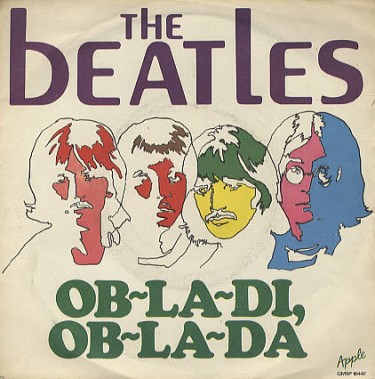Did Paul McCartney Acquire the Rights to the Phrase “Ob La Di, Ob La Da” in a Unique Fashion?
Here is the latest in a series of examinations into urban legends about music and whether they are true or false. Click here to view an archive of the movie urban legends featured so far.
MUSIC URBAN LEGEND: Paul McCartney got the rights to the phrase “Ob La Di, Ob La Da” by paying the legal fees of a friend of his who coined the phrase.
For such a simple song, “Ob La Di, Ob La Da” (which is on the Beatles “White Album”) has a bit of a controversial history with the Beatles.
Written by Paul McCartney, the other three Beatles were not fans of the song and actually blocked it from being released in the United States a single (John Lennon apparently loathed the song, according to studio engineer Geoff Emerick, although Lennon also is the one who came up with the idea of doing the song with a fast tempo, as McCartney was spending such a long time trying the song as a slow tune that Lennon got frustrated and showed him how the song sounded better fast).
The name of the song is courtesy of a friend of McCartney’s by the name of Jimmy Anonmuogharan Scott Emuakpor. He went by “Jimmy Scott.” Scott was Nigerian and he used the phrase often, which he said meant “life goes on” in the language of his native tribe back in Nigeria. So he would often say, “Ob la di, ob la da, life goes on, bra.”
McCartney decided to adopt the phrase into a song.
This, naturally enough, kind of irritated Scott, who even had a band that he called “The Ob La Di Ob La Da” band.
In 1984, McCartney talked about Scott’s complaints in a Playboy interview:
He got annoyed when I did a song of it because he wanted a cut,” Paul told Playboy in 1984. “I said ‘Come on, Jimmy. It’s just an expression. If you’d written the song, you could have had the cut.’
When the Beatles Anthology came out (which featured alternate versions of “Ob La Di, Ob La Da,” as McCartney had recorded many different versions of the tune, including at least one with Scott on conga drums), McCartney also spoke about the song and Scott’s influence on it…
I had a friend called Jimmy Scott who was a Nigerian conga player, who I used to meet in the clubs in London. He had a few expressions, one of which was, ‘Ob la di ob la da, life goes on, bra’. I used to love this expression… He sounded like a philosopher to me. He was a great guy anyway and I said to him, ‘I really like that expression and I’m thinking of using it,’ and I sent him a cheque in recognition of that fact later because even though I had written the whole song and he didn’t help me, it was his expression.
It’s a very me song, in as much as it’s a fantasy about a couple of people who don’t really exist, Desmond and Molly. I’m keen on names too. Desmond is a very Caribbean name.
There is a legend about Scott and the rights to the song, namely that he was arrested in 1968/1969 and that he asked McCartney to help him out. McCartney agreed to pay his legal bills, but only if Scott agreed to drop any claims he had on the song.
Scott passed away in 1986.
Now here’s the thing. Scott’s widow, Lucrezia, has this to say on the topic:
Sir Paul Mc never had any agreement with my late husband Jimmy Scott about the rights to the words being forfeit for a sum of money when he was in trouble. As I was the one who contacted Sir Paul Mc I can verify this fact. May I repeat: no rights were forfeit and the next time we were going to meet according to Sir Paul on the phone that day was for a photo session for the white album, presumably before it was decided to be white. As I recall it was The People newspaper who spread this story after wrongly interpreting an interview with my late husband. As far as I am aware Paul himself has nevfer [sic] said such a thing. I should like to be corrected if he has.
Now I’ve read about a dozen Beatles books researching this story, and in about nine of them, they repeat the “Jimmy Scott was arrested and in exchange for McCartney paying his legal bills, McCartney insisted that he agree to drop any claims on the phrase.” NONE of the nine books, however, cite a source for that information.
I have not been able to come up with a source for that information.
Meanwhile, the guy’s widow says it didn’t happen.
Similarly, McCartney has discussed it in pretty frank terms on two different instances, and HE never said that it happened, either.
I, then, am leaning towards believing Scott’s widow and saying that it did not happen.
So I’m going with the legend as..
STATUS: Tentatively False
Feel free (heck, I implore you!) to write in with your suggestions for future urban legends columns! My e-mail address is bcronin@legendsrevealed.com






